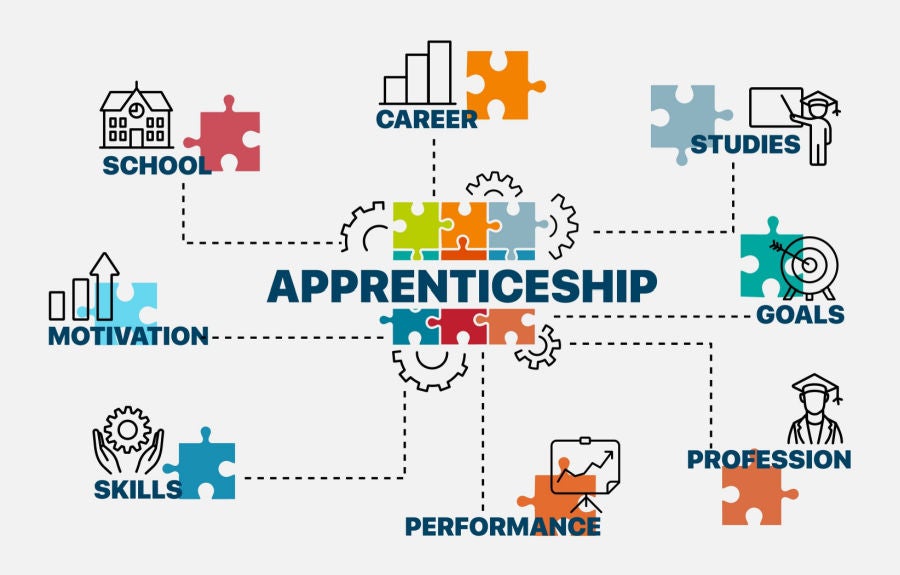
Joe Pickard speaks to Anthony Clarke, business development manager (employers) at the Association of Accounting Technicians (AAT), about how apprenticeship schemes can provide an alternative entry point for budding accountants to enter the profession, and how employers can best tap into this source of talent
Research conducted by the AAT found a 40% rise in people starting entry level apprenticeships so far in the 2022-23 financial year. Additionally, three-quarters (71%) of people who have studied or are currently studying an apprenticeship said this has allowed them to pursue their dream career.
The Accountant: How can accountancy firms that are aiming to increase their apprentice intake attract more talent?
Anthony Clarke: It’s really important to recognise that talent attraction doesn’t begin and end with the formal recruitment process. Talent attraction begins with having a strong brand and a tangible value proposition that potential talent can relate to. People need to be inspired to want to join your organisation and then take that first step to enter your application process.
Don’t underestimate the role that social media can play in enhancing your brand strength with potential future recruits. In a very competitive market, you can give yourself the edge by engaging with future talent as early as possible. Look to local schools and other organisations where you can increase your presence.
If you have apprentices already working at your firm, find opportunities for them to speak to and engage with potential future recruits as their story and journey will resonate far better than perhaps more experienced colleagues.
How well do you really know your competitors?
Access the most comprehensive Company Profiles on the market, powered by GlobalData. Save hours of research. Gain competitive edge.

Thank you!
Your download email will arrive shortly
Not ready to buy yet? Download a free sample
We are confident about the unique quality of our Company Profiles. However, we want you to make the most beneficial decision for your business, so we offer a free sample that you can download by submitting the below form
By GlobalDataTA: How does an apprenticeship in the accountancy industry increase later career prospects?
AC: Apprenticeships can provide the perfect combination of formal professional qualifications alongside the practical application of skills, knowledge and behaviours within the workplace. Nothing gives you that knowledge and those skills like working in the real world and seeing the modern-day challenges and opportunities that businesses face, and the resulting solutions that people work through on a daily basis.
As accounting is a profession, and a very skilled one at that, you of course need to be qualified, and ideally keep building on your qualifications to enhance your career and open up as many doors as possible.
Businesses don’t tend to invest their time, resources and money into apprenticeships just because they’re ‘a nice thing to do’, they do so to develop their talent and leaders of the future.
TA: What are the main benefits of becoming an accountant via an apprenticeship route as opposed to going to university first?
AC: Again it goes back to that real-world experience and that opportunity to work with other professionals on a day-to-day basis. Working in a professional business environment means that apprentices aren’t just learning in the classroom, they learn, almost by osmosis, just by seeing and listening to the way in which their colleagues operate.
But the social side is also so important, learning how to behave and how to interact in the workplace, with colleagues, stakeholders and other important people and developing their professional networks.
Additionally, and particularly in the current climate, the financial aspect can’t be overlooked. In a recent survey we conducted of just over 100 employers that support apprentices through their AAT qualifications, over a three-year period on average, apprentices will earn in the region of £50,000 ($60,045). Compared with the rising costs of university – tuition and maintenance making up over £50,000 on average – apprentices could find themselves around £100,000 better off over that period.
TA: How are apprentices looked on and valued in the accountancy profession?
AC: We get great feedback from employers about apprentices. They are keen to learn as much as they can because it not only helps them in their work, but in their qualification too.
I think we often see a great appetite from apprentices to get involved in as many things as possible so they can develop a rounded skillset and see what kind of work suits them best – maybe giving them a better idea if they would like to specialise in a particular role in the future.
We have seen some absolute superstars complete their AAT qualifications and apprenticeships in recent years who have gone on to further studies and moved into roles with increased responsibility.
TA: What type of work can an accountancy apprentice expect to carry out when they first start? Which departments are they likely to start in?
AC: This really varies from sector to sector. Specifically in practice, we have seen a significant increase in the number of apprentices being recruited into audit teams. Roles in tax, advisory and business services are also very common. Additionally, roles such as finance assistant, purchase and sales ledger and bookkeeper are very popular.
TA: How can people interested in becoming an apprentice within the accountancy industry search for placements?
AC: The best place to start is by visiting www.aat.org.uk/apprenticeships/becoming, where you will find a range of information that will help you find that apprenticeship. Here you will also find a vacancy board of organisations currently recruiting for accountancy apprentices.
TA: What are the traditional barriers to entry into the accountancy profession?
AC: I think in years gone by it may have been the qualifications – people looking at them and saying it’s too daunting, or it takes too long and they need to be earning now. Or perhaps that you have to go to university if you want to be an accountant. That’s of course where apprenticeships help because you can earn while you learn and get qualified.
Maybe there were also some stereotypes around who can enter the profession, but we have seen a real commitment from firms to develop inclusive cultures with greater diversity within their finance teams alongside commitment to improving social mobility and recruiting from an increasingly diverse talent pool.






